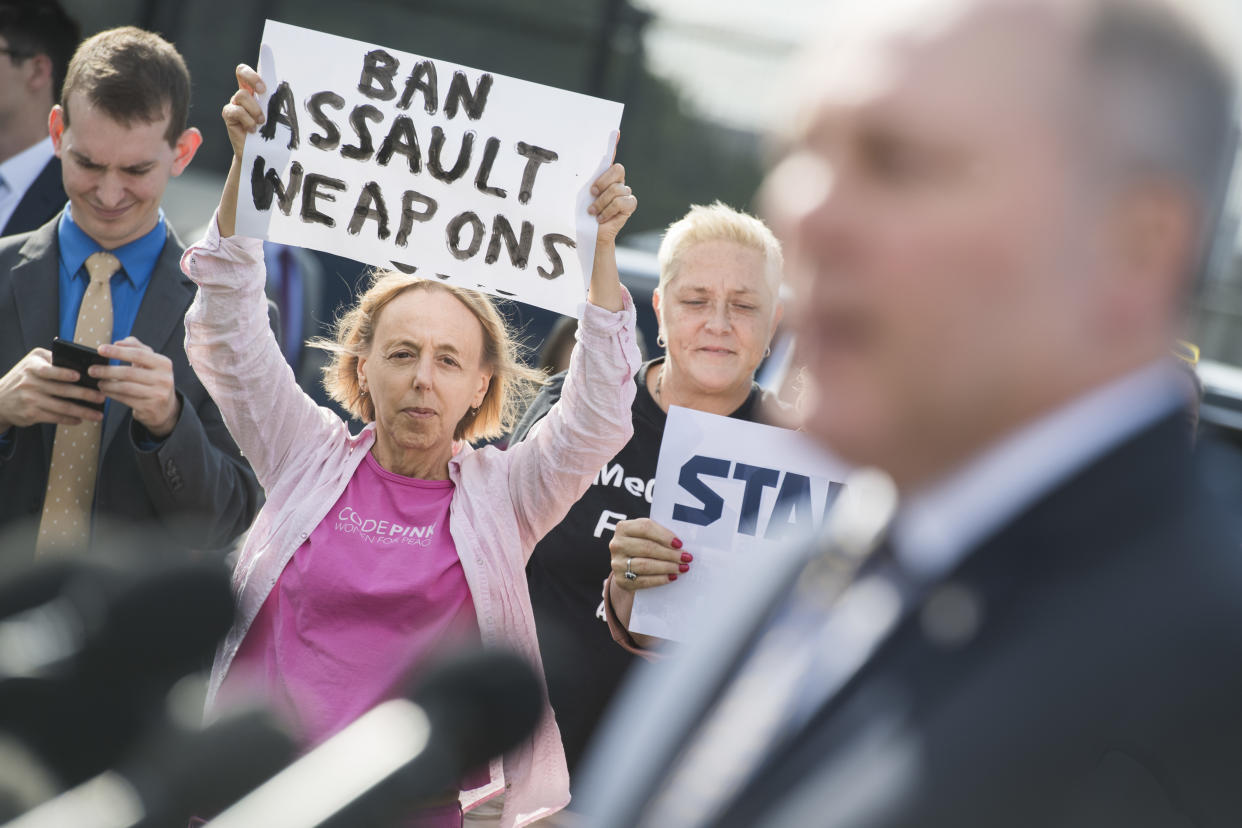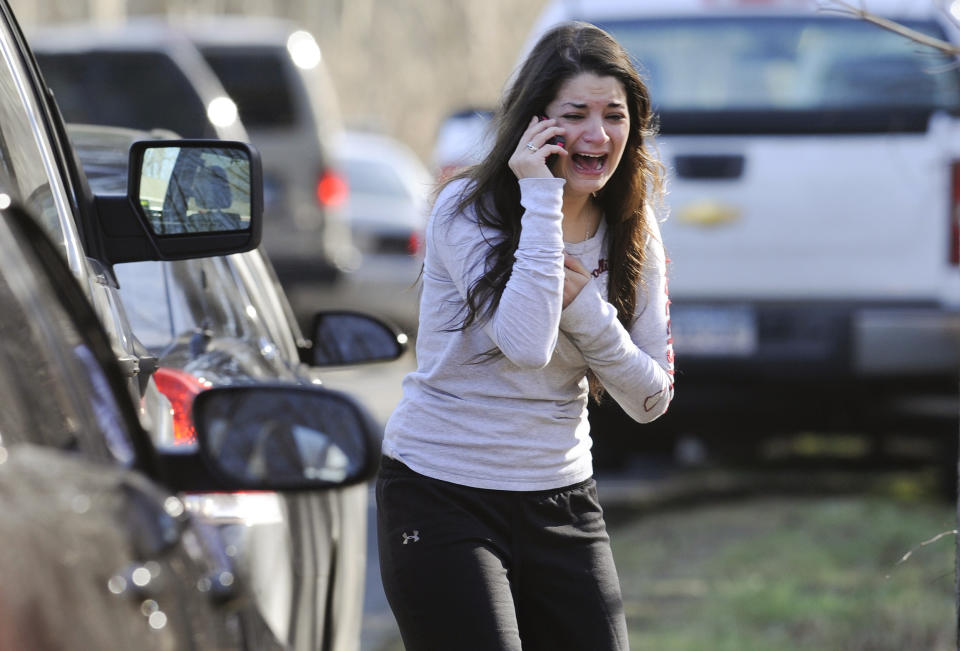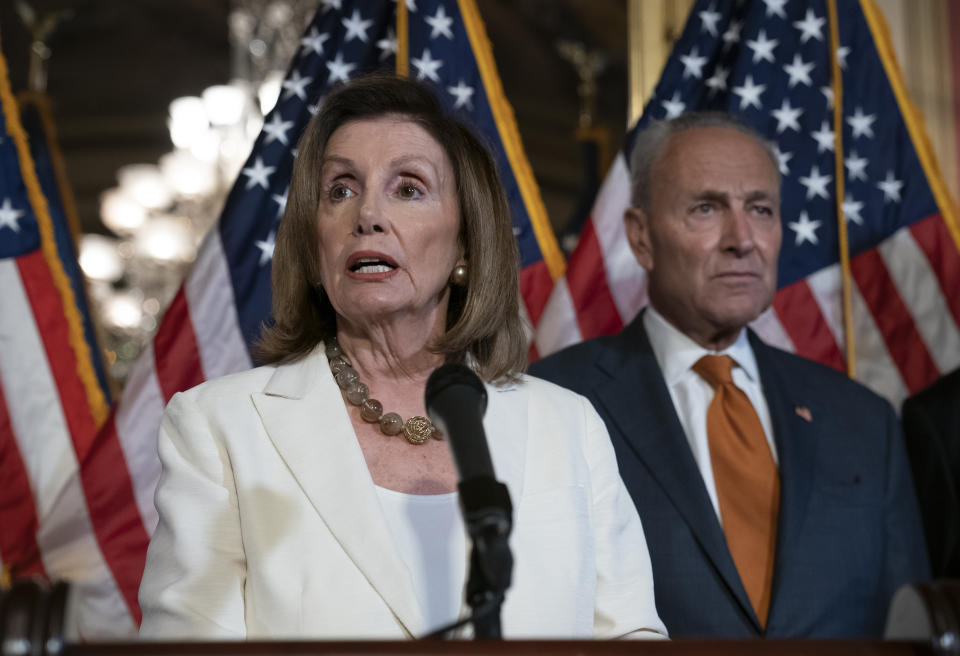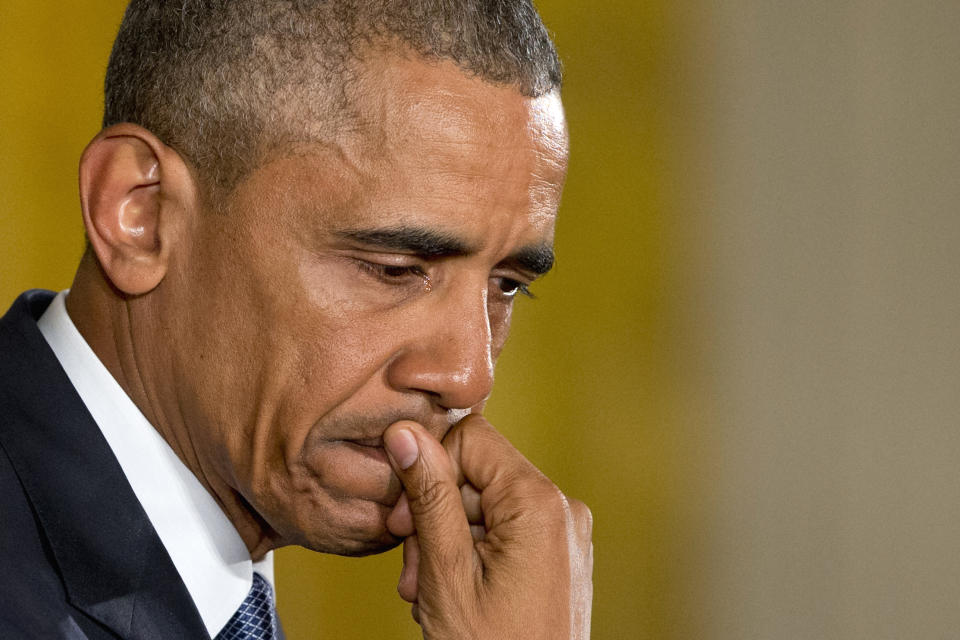With viral moments and hard facts, Democrats seek to seize the moment on gun control

WASHINGTON — The recording was brief but powerful: the hollow pop of gunfire, a fuzzy human voice. “That’s the sound of mass murder,” explained Dan Oates, who was the police chief in Aurora, Colo., when a gunman killed 12 people inside a movie theater seven years ago. The audio was from that shooting, the deadliest up to that time. The number of dead has been eclipsed many times since.
“I don’t think most Americans understand the true horror of such events,” Oates said.
He was speaking at a congressional briefing, called Countering Mass Shootings in the United States, hosted by George Mason University on Tuesday in a large Senate office building hearing room where nearly every chair reserved for audience members appeared to be filled. Many of them were young, and not all were of the typical gun control crowd. One name on the sign-in sheet was listed as being from the office of Sen. Pat Toomey, R-Pa., who has indicated a willingness to work on the issue.
Though the fall congressional session is not yet a week old, there have already been a number of significant events related to gun control on Capitol Hill (and, to a lesser extent, on Pennsylvania Avenue). That suggests the furious debate over Second Amendment rights and restrictions will dominate the following months, especially after a bloody summer in which 53 Americans were killed in mass shootings in August. There have been a total of 304 mass shootings this year, according to the Gun Violence Archive.
The question is how to move meaningful legislation in a notoriously constipated Washington. After years of trying, Democrats seem to think they have the answer, one that combines legislative pressure, arguments based on new social science research and a social media campaign that galvanizes the left while putting the right on the defensive. They know that with the National Rifle Association in disarray and public opinion strongly on their side, they may not have a chance like this again.

“This is not political for me,” said Rep. Jahana Hayes, D-Conn., at one of several hearings on guns that have already taken place in the fall session’s first week. “It is heartbreaking,” said the former Connecticut teacher of the year. “It is unacceptable and it is traumatic.”
“What are my colleagues afraid of?” Hayes wondered, speaking specifically about the need for the federal government to gather data on mass shootings. Republicans have resisted such measures, but will increasingly find it difficult to do so, as the public desire for a solution to the nation’s gun violence plague appears only to be increasing.
The district Hayes represents, as she noted, includes Newtown, where 20 children were slaughtered by a gunman at Sandy Hook Elementary School in 2012. Around the same time that she was speaking on Capitol Hill, a powerful advertisement by the gun control group Sandy Hook Promise was going viral on the internet. Beginning as a seemingly ordinary back-to-school commercial of the sort that play every September, the ad quickly turns to scenes of schoolhouse carnage, with students using back-to-school supplies to protect themselves during a shooting. As of Thursday afternoon, the video had been viewed more than 1.5 million times on YouTube and had received extensive media coverage.
The most critical legislation for Democrats is H.R. 8, a bill passed by the House of Representatives more than six months ago. If it were to become law, H.R. 8 would significantly expand background checks for gun purchases, a move supported by the overwhelming majority of Americans. The bill is a top legislative priority for House Speaker Nancy Pelosi. It is also a bill that Senate Majority Leader Mitch McConnell, a man known as “the grim reaper” for his uncanny ability to keep bills from maturing into laws, intends to smother.

That normally wouldn’t be a problem for McConnell, except that this is a bill whose basic principle — that certain people shouldn’t own guns — is supported by 92 percent of Republicans, and 94 percent of all Americans. “Pressure has to stay on McConnell,” a senior Pelosi aide acknowledged to Yahoo News in a text message. Some of that pressure will come directly from Pelosi herself, who is at least as skilled a politician as her Senate counterpart and adversary McConnell.
Yet the best chance the Democrats have on background checks — and any future gun control measure, including a renewed assault weapons ban, also supported by most Americans — is to circumvent McConnell and take their case directly to the people. They know that while McConnell couldn’t care less about popular perceptions, Trump cares deeply. The president was once a supporter of gun control, and Democrats think they can still appeal to the New Yorker in him. Trump’s native city has never embodied or embraced gun culture, and he has all but admitted that his pro-gun stance is borne of political expediency.
Pelosi and Senate Minority Leader Chuck Schumer spoke to Trump on Sunday, the 200th day since the bill’s passage in the House. They envisioned a “historic signing ceremony at the Rose Garden,” playing on the president’s love of fanfare. But they failed to close the deal. The White House described the conversation as “cordial,” adding that the president “made no commitments on H.R. 8, but instead indicated his interest in working to find a bipartisan legislative solution on appropriate responses to the issue of mass gun violence.”

That does not sound especially encouraging, but Politico reported on Wednesday that Attorney General William Barr was covertly circulating a memorandum on background checks to Republicans on Capitol Hill. The White House quickly renounced the effort, but it is inconceivable that a Trump loyalist like Barr would do anything so bold without the president’s approval.
Secretive machinations aside, Republicans publicly continue to insist that legislation like H.R. 8 is not the answer, and that efforts should be directed instead at mental health and violent video games. But as the George Mason briefing made clear, those positions are increasingly at odds with a growing body of scholarly research on gun violence.
Until fairly recently, gun research simply did not exist. Today that research is being conducted at some of the top universities in the nation. Berkeley sociologist Jennifer L. Skeem presented on the tenuous link between mental health and mass shootings. “Mental illness plays a limited role in violence,” she said, pointing to statistics that found only 4 percent of violent acts in the United States were committed as a result of mental illness.
Christopher S. Koper of George Mason University discussed research that found the expiration of the federal assault weapons ban in 2004 “was followed by an increase in the use of these weapons in mass shootings and other crimes.” Democrats want to reinstate that ban; presidential candidate Beto O’Rourke, the former Texas congressman, has gone as far as suggesting a mandatory federal buyback program for assault weapons.

Daniel S. Nagin, a Carnegie Mellon criminologist, concluded the briefing with recommendations that largely mirrored Democratic policy goals. Foremost among these: “Staunching the growth of high capacity firearms that allow perpetrators to kill or injure large numbers of people in minutes or less.”
Most people will never read these academic papers; nor will most legislators, for that matter. And yet, given the widespread anxiety about mass shootings, the conclusions are bound to seep into the national discourse. And as they do, they could convince a growing number of Americans to see guns as they now see cigarettes — as a public health hazard whose dangers should be minimized. In fact, when Trump proposed a ban on a type of smoking known as vaping last week, Twitter users retorted with a message of their own: “Now do AR-15s.”
The most immediate reason that H.R. 8 remains in legislative limbo is McConnell, who has been resistant to gun control legislation. Speaking on Tuesday, he acknowledged that after the mass shootings in El Paso and Dayton last month — separated by hours and killing dozens — “we owe it to the American people to act.” For him, however, inaction is a politically necessary strategy, regardless of what he actually thinks of background checks. Were he to bring the legislation to the Senate floor, McConnell would be forcing his fellow Republicans to take an incredibly difficult vote, one that opens them to potential criticism from both sides of the issue.

McConnell has no intention of doing so, at least not at this stage. “The president has already indicated he would veto the bill that came over from the House,” he said on Tuesday. Trump made that decision after speaking with Wayne LaPierre, the embattled chief executive of the NRA, which has single-handedly hindered action on guns.
But with the NRA in the midst of a leadership dispute, this could be the moment when centrist Republicans dare to act on their convictions. They can’t do so without McConnell’s license, but Democrats are happy to have him explain his reluctance, and whether it has anything to do with the more than $1.2 million he has received from the NRA in political contributions over the years. Earlier this week, Pelosi said that for McConnell to refuse to bring H.R. 8 to the Senate floor was “to abdicate your role as leader.”
For decades, the NRA’s power has been in its bank account: The lobbying group has made $237 million in federal political contributions, outside spending and lobbying since 1990; a full 84 percent of its federal political contributions have gone to Republican candidates. And it has increased its spending on political campaigns by 317 percent since 2010, when the Citizens United decision by the Supreme Court significantly deregulated the flow of money into political campaigns, as well as disclosures regarding such contributions.
That’s why some think the only way to truly curb gun violence is to first curb the influence of corporate and “dark” money in American politics. That was the purpose of a Tuesday gathering held by End Citizens United at the National Press Club, a few blocks from the White House.

Speaking at the event was Sen. Richard Blumenthal, a Democrat from Connecticut, where in 2012 a gunman killed 20 children at Sandy Hook Elementary School. A tearful President Barack Obama vowed to enact Second Amendment restrictions, but congressional Republicans prevented him from doing so. “A difference of opinion is not what is preventing action on gun violence reform,” Blumenthal said. “Dark money is.”
Standing, and speaking, alongside Blumenthal was Rep. Lucy McBath, D-Ga., who was elected to Congress in 2018 on the strength of her gun control message. Her teenage son Jordan Davis was killed in Florida seven years ago by a gunman who objected to the rap music that Davis and his friends were playing. The killing was widely believed to be racially motivated, but also a product of Florida’s “stand your ground” laws.
At the National Press Club, McBath yearned to “go back to the day when Americans believed in the power of one person, one vote, not one dollar, one vote.”
End Citizens United has also met with many of the Democrats vying to be next year’s presidential nominee. The group presented them with polling from 12 electorally relevant states that found broad support for the message of curbing the influence of cash in politics. Bawadden Sayed, deputy communications director of End Citizens United, told Yahoo News that seven candidates so far have indicated that they would push for anti-corruption and campaign finance reform legislation as their first act upon becoming president.

For now, the Democrats have to hope they can alchemize popular will and political calculus into a tangible accomplishment. That calculus involves keeping the issue in the news, where they present themselves as seeking solutions on the public’s behalf, and not just because they’re doing what Democrats have always done on guns.
And with every new congressional hearing, there is the possibility of a viral moment, or at least one that makes news. Already there was the widely shared clip of Sen. Martin Heinrich, D-N.M., embarrassing John Lott — a pro-gun scholar whose work has been discredited — at a hearing by forcing him to admit he had once created a fake email account to praise himself online.
There was also Sen. Michael Bennet, D-Colo., going after McConnell on the Senate floor, reminiscent of his diatribe against Sen. Ted Cruz, R-Texas, earlier this year, which made him an internet celebrity and helped launch his presidential bid. This time around, Bennet quoted McConnell, who in 2014 said the Senate “should be setting national priorities, not simply waiting on the White House to do it for us.”
Meanwhile, Rep. Don Beyer, D-Va., used a House hearing to read aloud the names of all 59 countries that he said have lower firearm fatality rates than the United States. It was a preposterous moment, and all the more powerful for it. The Democrats will need many more of them — from Beyer and his 247 colleagues in both chambers of Congress — if they want to have any hope of compelling Trump to silence the sound of gunfire.
_____
Download the Yahoo News app to customize your experience.
Read more from Yahoo News:
Kavanaugh book authors: 2020 Democrats had a 'rush to judgment' on impeachment after NYT op-ed
Russia carried out a 'stunning' breach of FBI communications system
Court revives suit alleging Fox News inflicted 'emotional torture' on Seth Rich family
After hours of questioning Lewandowski, Democrats finally land punches



